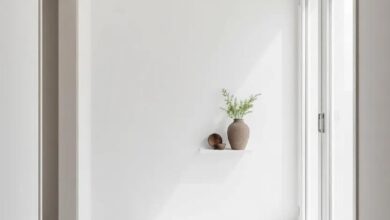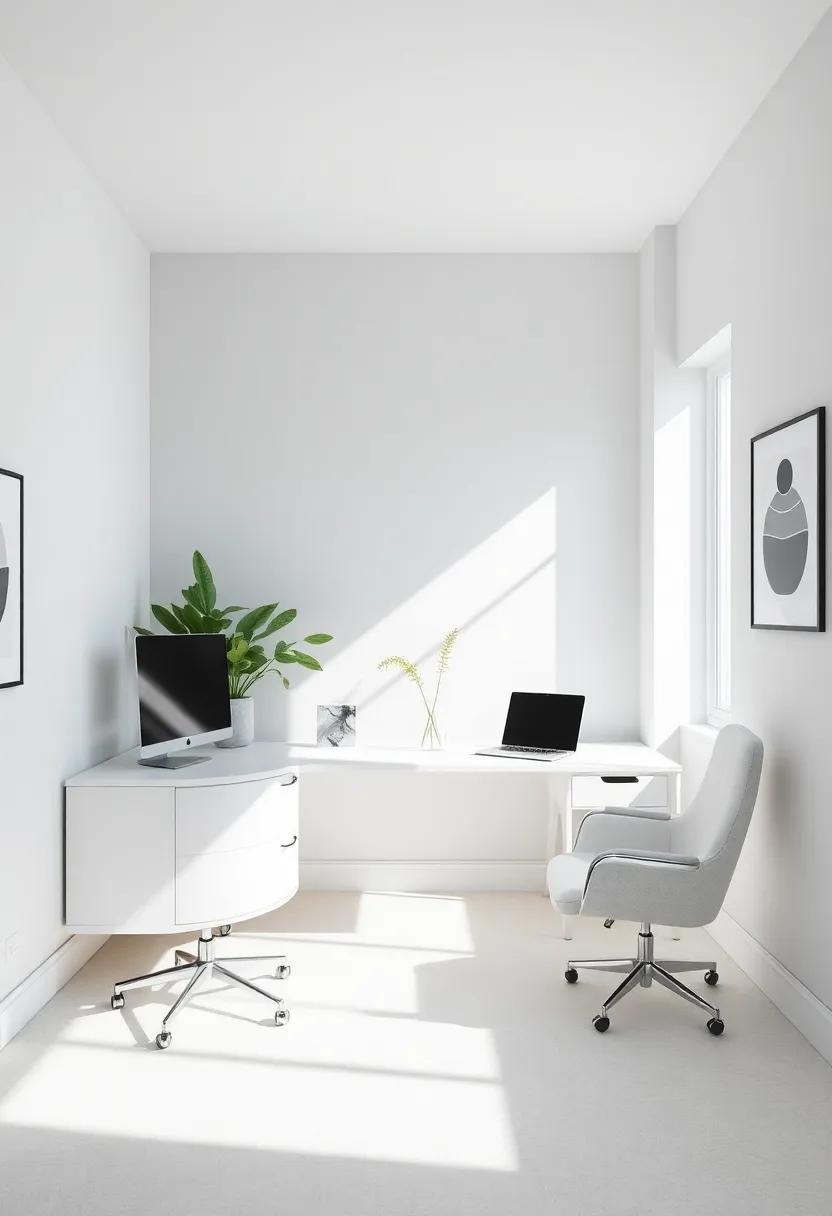
Creating Harmony: Designing the Perfect Home Office for Two Professionals
In an era where remote work has woven itself into the fabric of daily life,the home office has transformed from a simple workspace into a sanctuary of productivity and creativity. For couples navigating the delicate balance of shared professional aspirations and personal space, designing the perfect home office presents both a challenge and an opportunity. Imagine a room that fosters collaboration while offering the serenity needed for deep concentration—a space that not onyl reflects individual styles but also harmonizes the dynamic rhythms of two professionals. In this article, we will explore essential considerations, innovative design strategies, and practical tips for crafting a dual workspace that promotes efficiency and inspires collaboration, ensuring that both partners can thrive in their professional pursuits without sacrificing comfort or style. Join us as we delve into the art of creating a home office that beautifully balances functionality and aesthetics for two.
Creating a Welcoming Atmosphere with Natural Light in your Dual Workspace
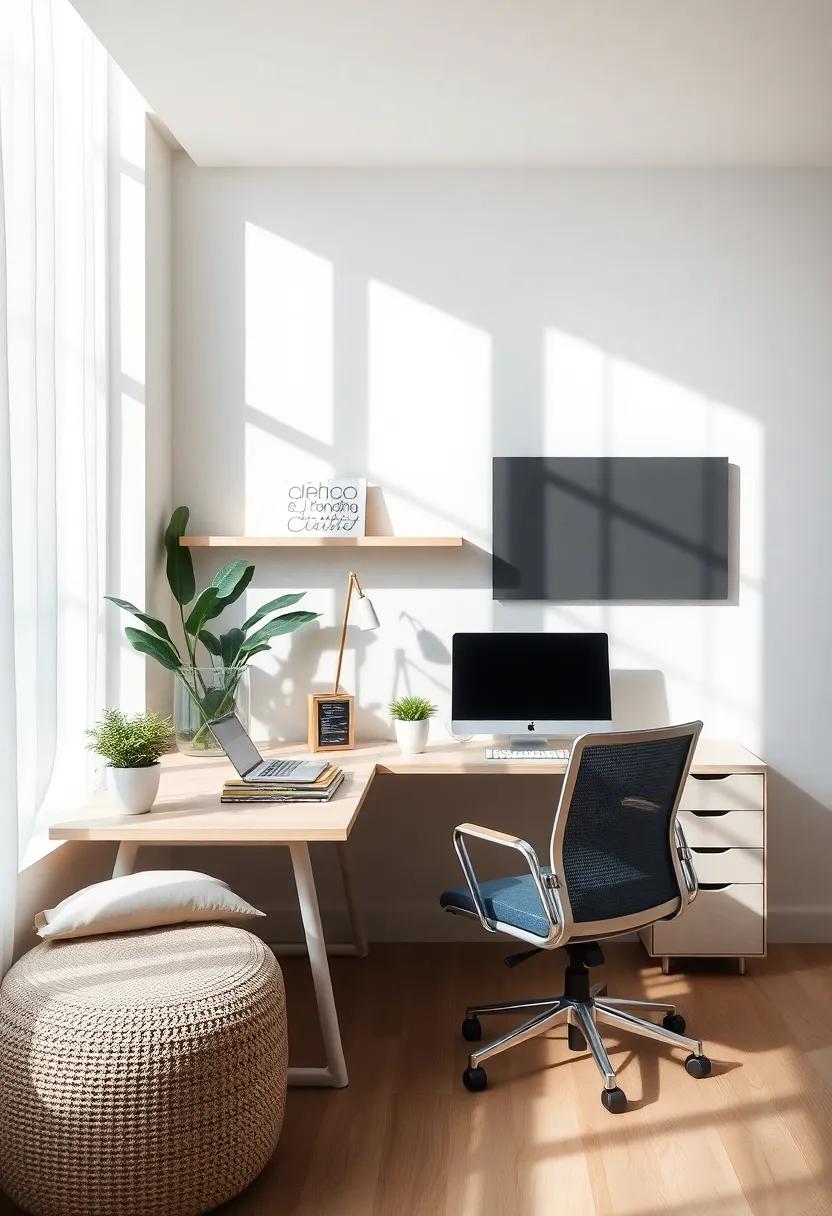
Natural light serves as a vital component in creating an inviting and productive atmosphere in a dual workspace. Maximizing sunlight not only enhances the aesthetic appeal but also positively impacts mood and productivity levels. Position your desks near large windows or consider using transparent or sheer drapes that diffuse harsh sunlight while allowing ample light to fill the room.Additionally, strategic placement of mirrors can reflect light deeper into the space, creating an illusion of a larger and more open environment. To further embrace the benefits of natural light, consider incorporating indoor plants that thrive in bright settings—these can infuse a sense of tranquility while also improving air quality.
When designing your workspace, think about layered lighting to complement the natural light and provide support for evening work hours or overcast days. Incorporate adjustable desk lamps with warm,LED bulbs to create a cozy ambiance as needed. It may be favorable to blend styles and functionalities to suit both professionals’ preferences.You can have each desk equipped with individual task lights or consider a communal overhead fixture that provides soft illumination without overshadowing the beauty of natural light. Remember, a harmonious design not only accommodates your work needs but also fosters collaboration and creativity.
| Natural Light Tips | Benefits |
|---|---|
| Position desks by windows | Increases productivity |
| Use sheer window treatments | Softens light, reduces glare |
| Incorporate mirrors | Enhances brightness and depth |
| Add indoor plants | Improves air quality and tranquility |
| Adjustable desk lamps | Provides flexibility and comfort |
For more ideas on maximizing natural light in your workspace, check out Houzz.
Balancing Functionality and Aesthetics in a Shared Office Environment
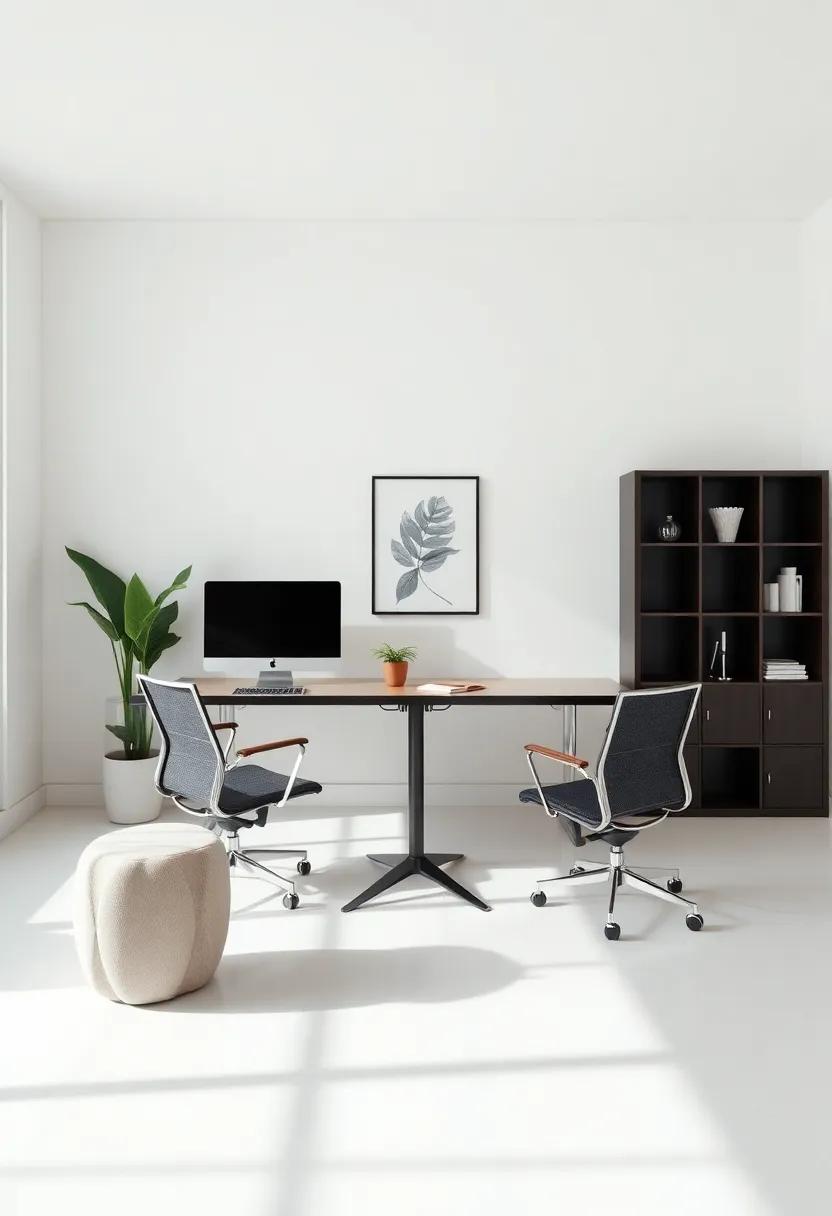
In a shared office environment, achieving a balance between functionality and aesthetics is essential for fostering productivity and comfort. Practical considerations shoudl be at the forefront, ensuring that both professionals have access to what they need without sacrificing style. Items such as ergonomic chairs, height-adjustable desks, and effective storage solutions can seamlessly blend with decorative touches. consider integrating multi-functional furniture pieces that can serve a dual purpose, such as a stylish bookshelf doubling as a room divider or a desk with built-in storage, keeping the workspace organized and visually appealing.The goal is to create a space where both individuals can thrive, reducing clutter while enhancing the overall atmosphere.
Colour palettes and decorative elements also play a crucial role in this harmony. Soft, neutral tones can create a calming backdrop that allows for personal expression through artwork or plants. Incorporating elements like natural light, through strategically placed mirrors, can enhance the aesthetic while supporting a healthy work environment. Here are some tips for achieving this balance:
- Dual-purpose furniture – Choose pieces that optimize space.
- Complementary color schemes – Use colors that work well together to create a cohesive look.
- Smart storage solutions – Implement hidden storage to maintain a clean aesthetic.
Utilizing technology can also support this balance. As an exmaple, employing cable management systems not only keeps the workspace tidy but enhances the visual appeal. Additionally,consider incorporating elements like a collaborative whiteboard,which can serve both aesthetic and functional purposes for brainstorming sessions. The convergence of form and function helps in fostering a hybrid environment conducive to productivity while still being visually satisfying. For further insights on interior design balancing workspaces, explore Houzz.
Choosing the Ideal color Palette for inspiration and Productivity
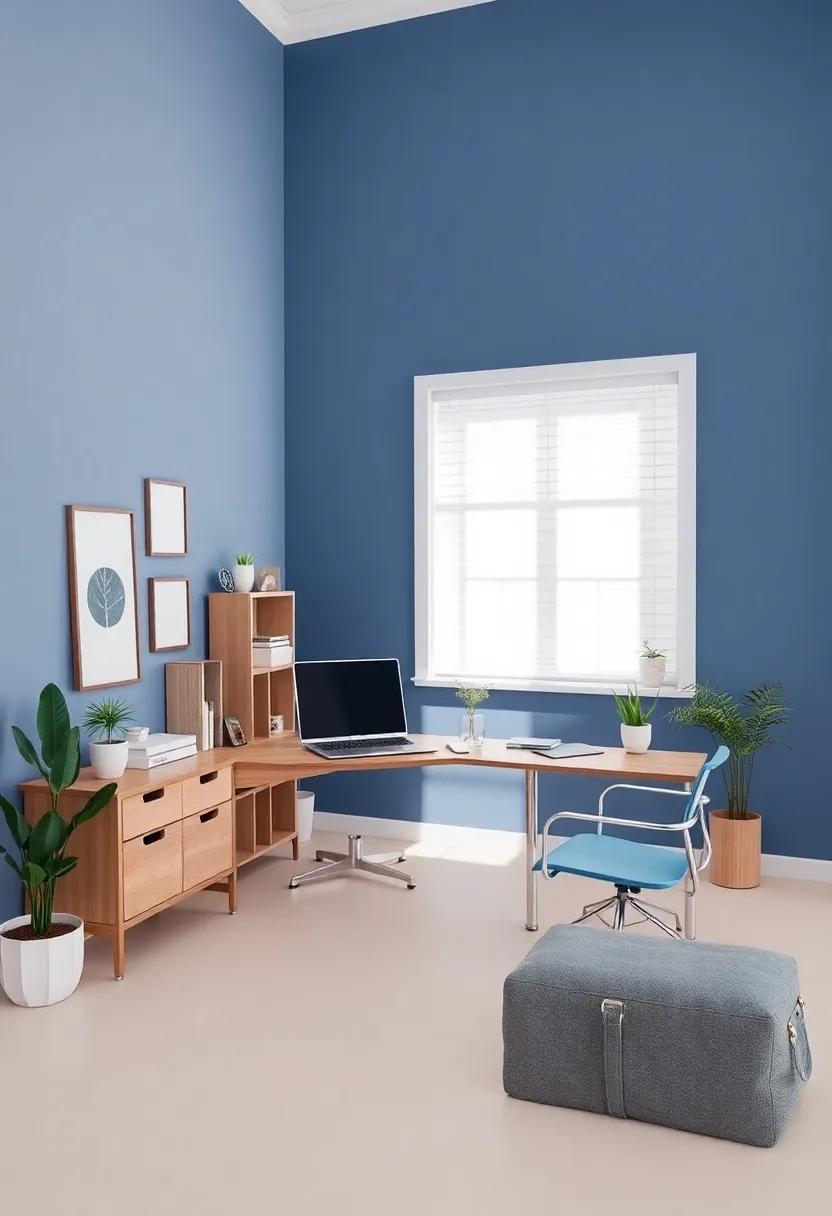
When selecting a color palette for your home office, consider hues that inspire creativity and enhance productivity. Cool tones, such as blues and greens, are known to promote calmness and focus, making them ideal for a work environment. On the other hand, warm shades, like yellows and oranges, can energize the space, creating a vibrant and stimulating atmosphere. It’s crucial to find a balance; perhaps using soft neutrals as a base can provide stability, while accent colors add personality. Creating a cohesive look might involve integrating colors from your favorite artworks or decor items, allowing the space to reflect your style while maintaining functionality.
To ensure harmony throughout the room, consider implementing a color scheme that incorporates both partners’ preferences.This can be achieved by using a combination of analogous colors, which sit next to each other on the color wheel, or complementary colors for a more dynamic feel. You might also explore the psychological effects of each color, as they can influence mood and productivity levels. Here’s an overview of colors and their typical associations:
| Color | Association |
|---|---|
| Blue | Calming, Focus |
| Green | Balance, Growth |
| Yellow | optimism, Energy |
| Orange | Creativity, Enthusiasm |
| Gray | Neutrality, Peace |
For more guidance on color theory and how to apply it to your workspace, check out Color University,which offers extensive resources to help you make informed choices.
maximizing Space Efficiency with Smart Furniture Choices for Two
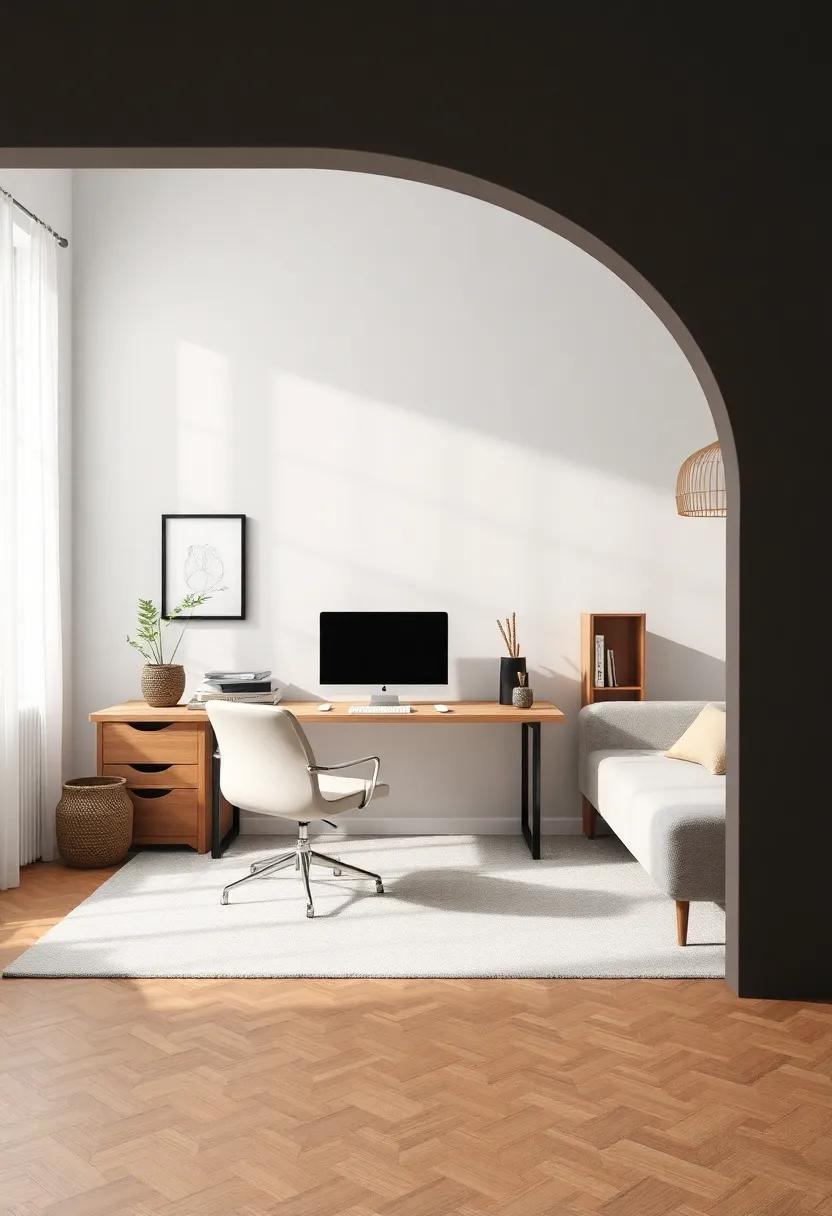
When designing a home office for two professionals,choosing multifunctional and compact furniture can dramatically enhance space utilization. Select desks with built-in shelving or organizers to minimize clutter while maximizing surface area. Consider adjustable desks that allow each individual to alternate between sitting and standing; this ergonomic option promotes health and productivity. opt for foldable chairs or stools that can be tucked away when not in use, ensuring the area maintains an open feel. Utilize vertical space through wall-mounted shelves to store books and supplies without sacrificing valuable floor space.
incorporating room dividers can create a sense of personal space while still allowing for collaboration. Choose options that include integrated storage or equipment, such as whiteboard panels or corkboards for shared brainstorming.A well-placed area rug can also help define each person’s workspace while adding warmth and character to the office. For a balanced aesthetic,unify styles and colors throughout the space. Creating a harmonious environment fosters a positive work atmosphere,encouraging both productivity and creativity. Explore more ideas for space optimization at Apartment Therapy.
Incorporating Personal Touches to Enhance Professional Identity
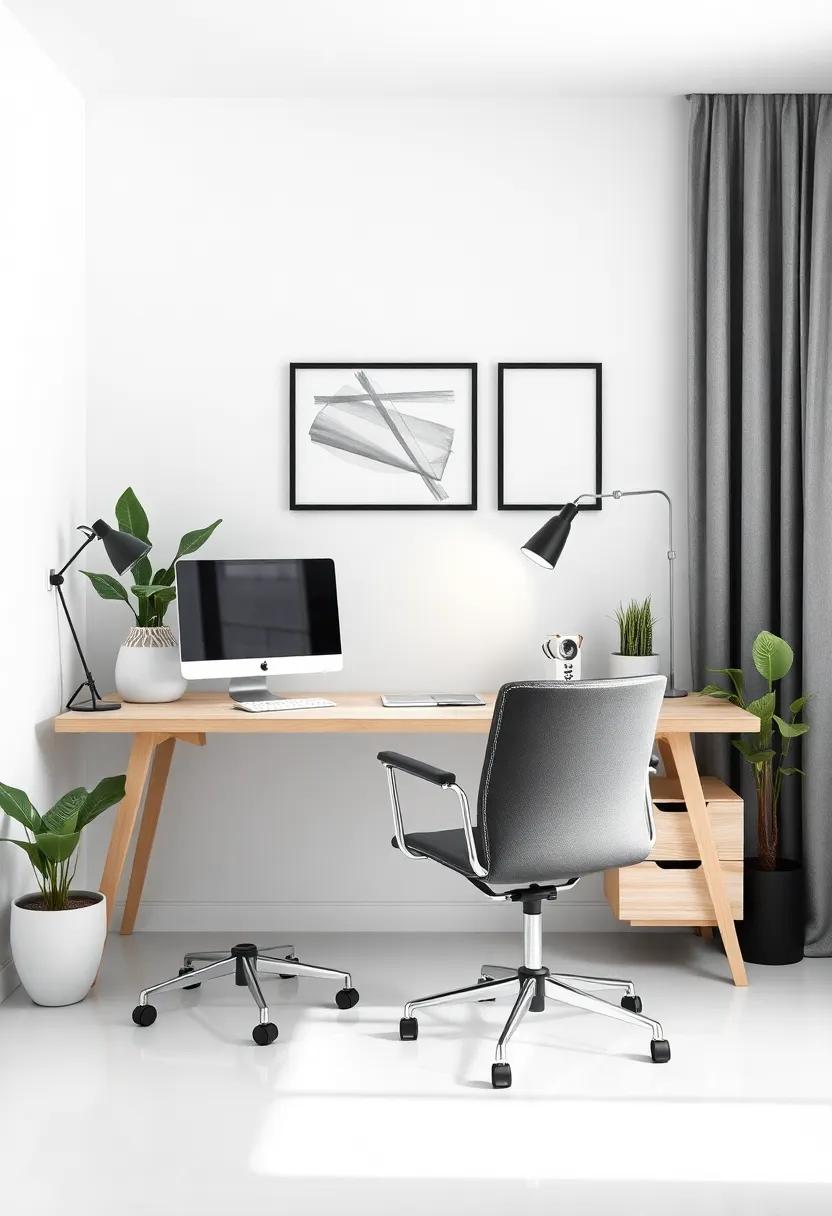
Transforming a shared workspace into a true reflection of both professionals can significantly enhance its functionality and aesthetic appeal. Start by incorporating personal décor that resonates with each individual’s personality. This could include:
- Framed photos of cherished memories
- Artwork or prints that inspire creativity
- Unique desk accessories that spark joy
Additionally, consider integrating elements that promote comfort and well-being, such as personalized plants or soothing color palettes. You might create a cohesive look by opting for a shared theme or complementary color schemes. For instance, using matching desk organizers or coordinating desk lamps can unify the space. Don’t forget functionality; each professional should have dedicated zones that reflect their work style, whether it’s a minimalist approach or a vibrant display of their favorite books and supplies. Explore more about personal branding at Forbes.
Designing Separate Zones for Focus and Collaboration in a Shared Space
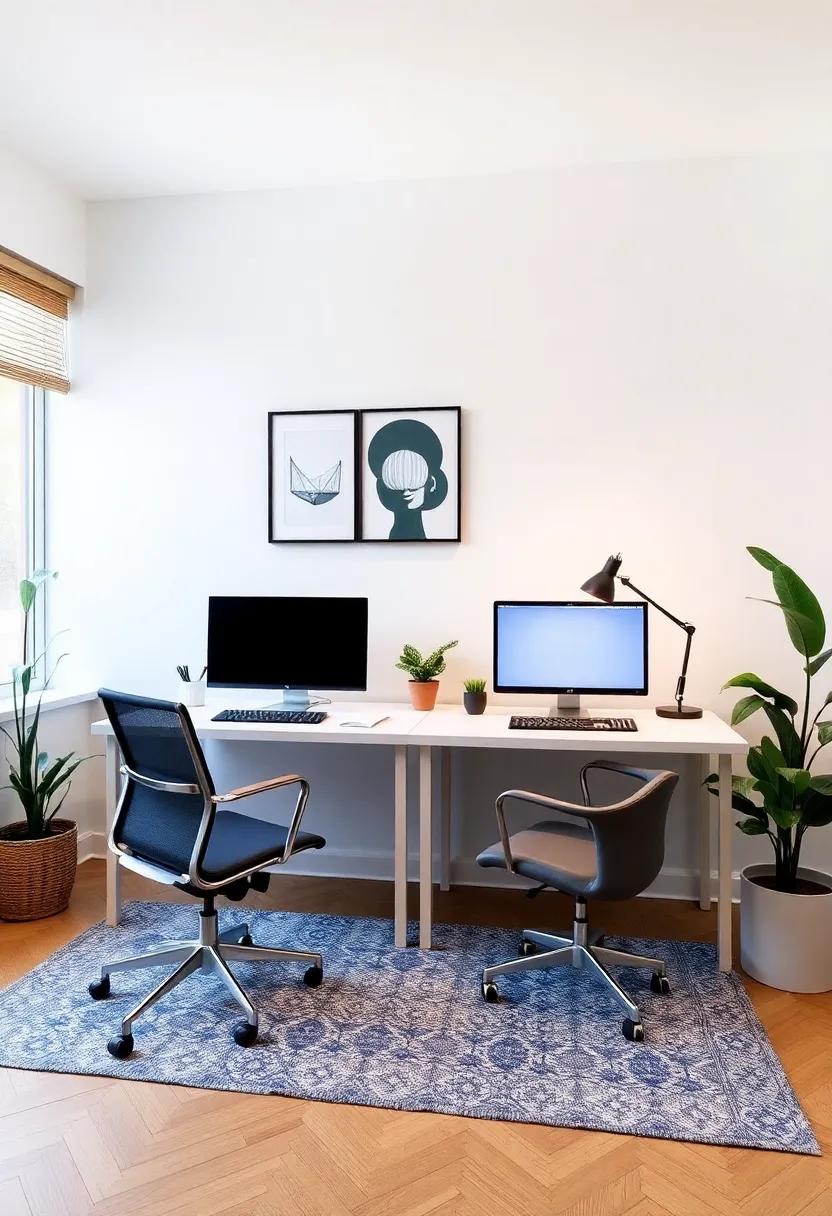
Creating a harmonious workspace for two professionals requires thoughtful zoning, balancing the need for both focus and collaboration. Designate specific areas that cater to these different modes of work.For focused tasks, consider a quiet nook equipped with ergonomic furniture, soundproofing elements, or even plants that promote concentration. Utilize dividers such as bookcases or decorative screens to create a sense of privacy without completely isolating the two of you. In addition, the colors in this area can be cool and muted—think soft blues or greens—to foster calmness and boost productivity.
On the other hand, for the collaborative zone, embrace an open layout with inspirational décor that encourages creativity and communication. Incorporate a round table that facilitates easy discussion, paired with comfortable seating to invite a casual atmosphere. maximize natural light in this area, which is known to enhance mood and innovation. You might also want to integrate shared tools such as a whiteboard or a chalkboard wall, where ideas can be freely expressed and visualized. Lastly, consider the acoustics; incorporating rugs or sound-absorbing materials can help maintain a pleasant sound level, making collaboration effective without being distracting.
| Focus area | Collaboration Area |
|---|---|
| Quiet nook with ergonomic chairs | Round table with comfortable seating |
| Soundproofing elements | Whiteboard or chalkboard for brainstorming |
| Muted colors for calmness | Bright colors for inspiration |
For more insights on designing functional workspaces, visit Forbes.
Selecting Ergonomic Desk Solutions to Foster Comfort and Health
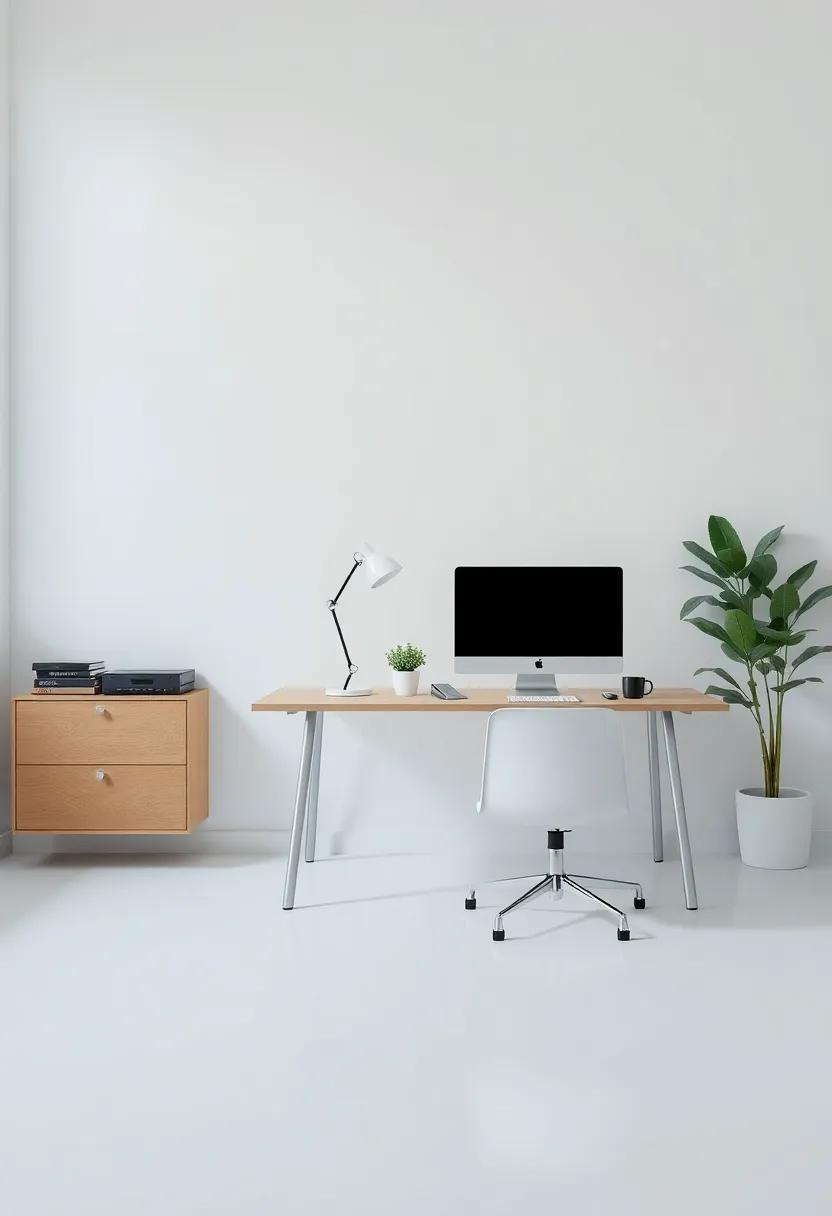
When crafting a comfortable workspace, it’s essential to focus on ergonomic desk solutions that cater specifically to the needs of both professionals. Investing in adjustable desks allows individuals to switch between sitting and standing, promoting healthy posture and reducing fatigue. in addition, consider adding ergonomic chairs that provide adequate lumbar support, encouraging users to maintain a neutral spine while working long hours. Key elements to look for include:
- Adjustable seat height
- 360-degree swivel capabilities
- Wider seat pan for additional comfort
- Armrests with adjustable height
To enhance the functionality of the home office,it’s crucial to incorporate accessories that further promote comfort.For instance,keyboard trays and monitor stands can be adjusted to the ideal height,preventing strain on the neck and wrists.Incorporating the following elements can help transform the workspace:
- footrests to support feet and improve circulation
- Desk organizers to minimize clutter and stress
- Proper lighting to reduce eye strain and fatigue
| Item | Benefit |
|---|---|
| Adjustable Desk | Promotes active sitting/standing |
| Ergonomic Chair | Supports proper posture |
| Monitor Stand | Reduces neck strain |
| Footrest | Enhances circulation |
For more facts on creating a workspace that promotes health and productivity, visit Healthline.
Utilizing Sound Management Techniques for a Peaceful Work Environment
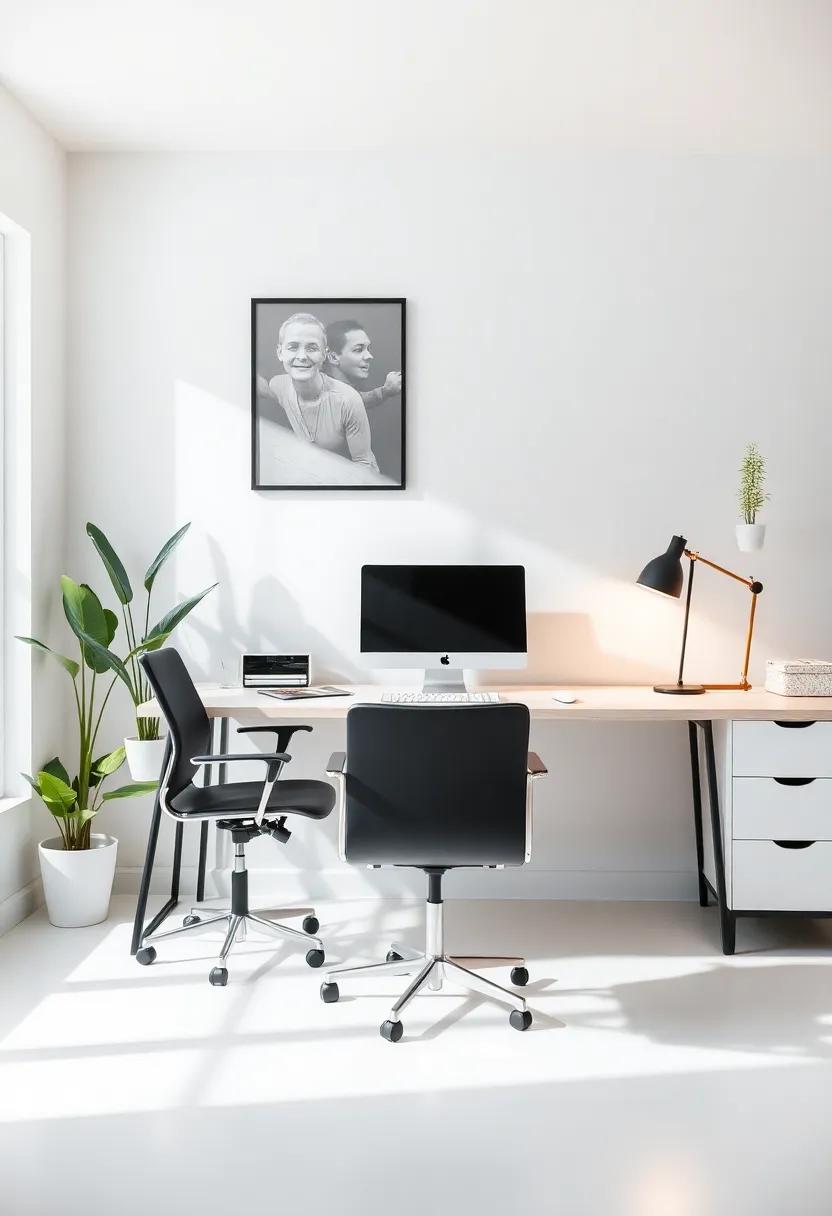
In a dual-professional home office, sound management techniques can significantly enhance productivity and reduce stress. One essential approach is to designate specific zones within the workspace. Consider creating a quiet zone for deep work and focused tasks, while also incorporating a collaborative area where both professionals can brainstorm and discuss ideas.Using acoustic panels or soft furnishings can absorb noise levels, contributing to a serene atmosphere.Here are some practical tips for optimizing sound in your shared office:
- Use noise-canceling headphones to minimize distractions.
- Implement soft lighting to create a calm ambiance.
- Incorporate plants, which can help to reduce sound reflection.
Establishing a shared sound etiquette is also pivotal in maintaining harmony. This includes setting agreed-upon times for calls and meetings, using muted notifications for devices, and incorporating background music or white noise machines to maintain a steady flow of sound. establishing these habits together aids in reinforcing a culture of respect and consideration, making the workspace more enjoyable for both parties. Furthermore, consider using a simple schedule to manage work times and breaks effectively:
| Time Slot | Activity |
|---|---|
| 9 AM – 11 AM | Focused Work |
| 11 AM – 11:30 AM | Break/Quiet Time |
| 11:30 AM - 1 PM | Collaborative Discussion |
| 1 PM – 2 PM | Lunch Break |
By implementing these sound management strategies, you can cultivate a more peaceful and productive shared work environment. For further insights on creating functional workspaces, you can explore more resources at Forbes.
Integrating Technology Seamlessly into Your Dual Office design
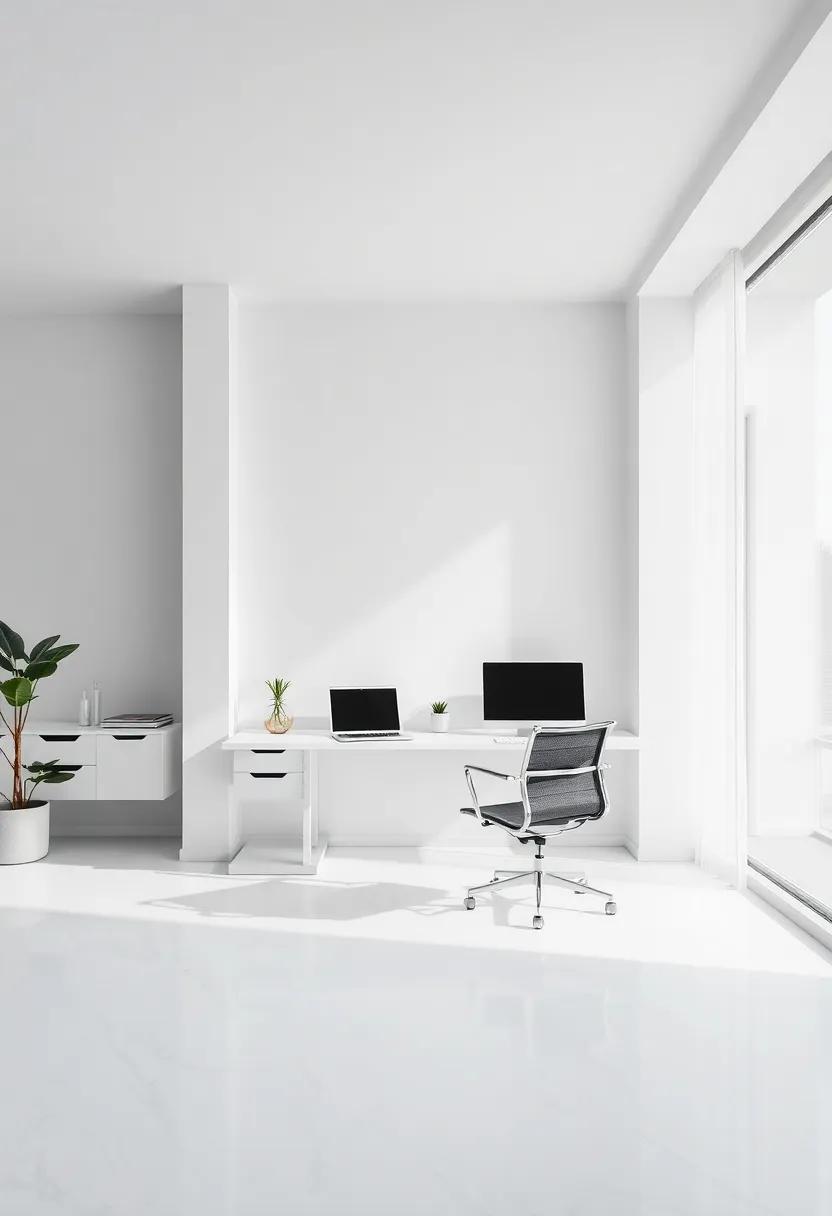
In today’s fast-paced work environment, having a well-integrated technological setup is essential, especially in a shared home office space. Seamless integration not only enhances productivity but also minimizes clutter and distractions.Start by choosing multi-functional furniture that can accommodate various devices. Look for desks with built-in cable management systems to keep cords organized and out of sight. Consider investing in ergonomic chairs equipped with USB ports or integrated technology to ensure comfort while maintaining connectivity.
Another key element in your dual office design is the use of smart devices that promote collaboration and efficiency.Implement tools such as wireless printers, high-definition webcams for video calls, and cloud-based software to facilitate real-time collaboration on projects.Making use of apps to manage workspace environments can also improve air quality and lighting based on individual preferences. Creating an organized technology spreadsheet to outline essential tech gadgets,their purposes,and locations can keep both professionals on the same page and foster harmony in the workspace.
| Tech Gadget | Purpose | Recommended Brand |
|---|---|---|
| Smart Hub | Centralized control for smart devices | Amazon Echo |
| Wireless Printer | Printing without the hassle of cables | HP |
| Webcam | High-quality video streaming | Logitech |
For more tips on how to enhance your work-from-home environment through effective tech integration, visit TechCrunch.
Creating a Shared Calendar and Planning Space for Co-ordination
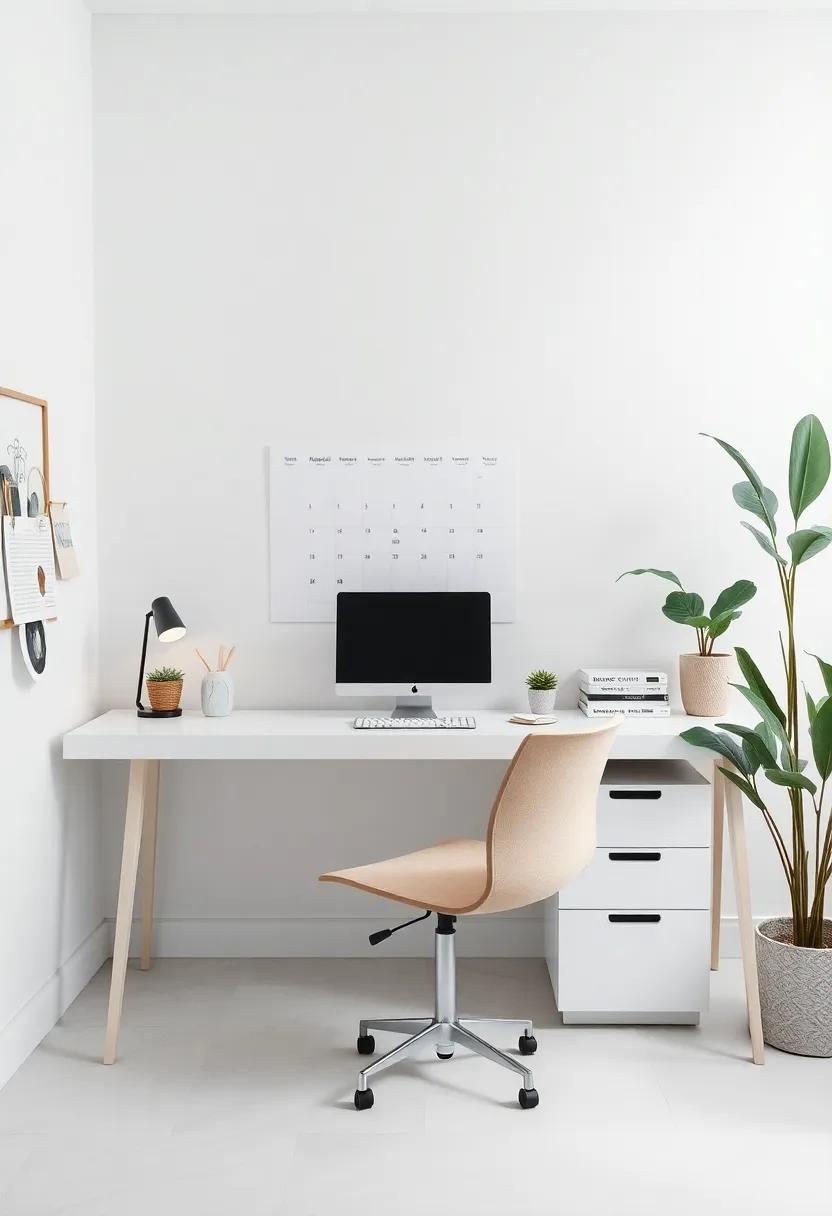
For both professionals sharing a home office, effective coordination is key to enhancing productivity. One of the best ways to achieve this is by creating a shared calendar that serves as a centralized hub for scheduling meetings, deadlines, and personal commitments. A digital calendar, like Google calendar, can be invaluable.By color-coding events based on work and personal categories, you can quickly scan schedules and avoid conflicts. Consider setting recurring reminders for crucial tasks or weekly planning sessions to ensure both parties remain aligned.
Additionally, having a dedicated planning space within the home office can transform how you manage daily tasks and goals. This area can include a whiteboard or corkboard displaying key dates and milestones, fostering a collaborative environment. Creating a visually structured layout might include:
- Visible Task Lists: Use pinned notes for immediate visibility.
- Weekly Spotlights: Highlight the week’s focus areas or key projects.
- Reflection Spaces: Designate a spot for end-of-week reviews.
By combining a shared calendar with a physical planning space, you can create a harmonious environment that keeps both professionals on the same page, ensuring smooth communication and shared goals.
Bringing Nature Indoors with Plants and Greenery for a Fresh Feel
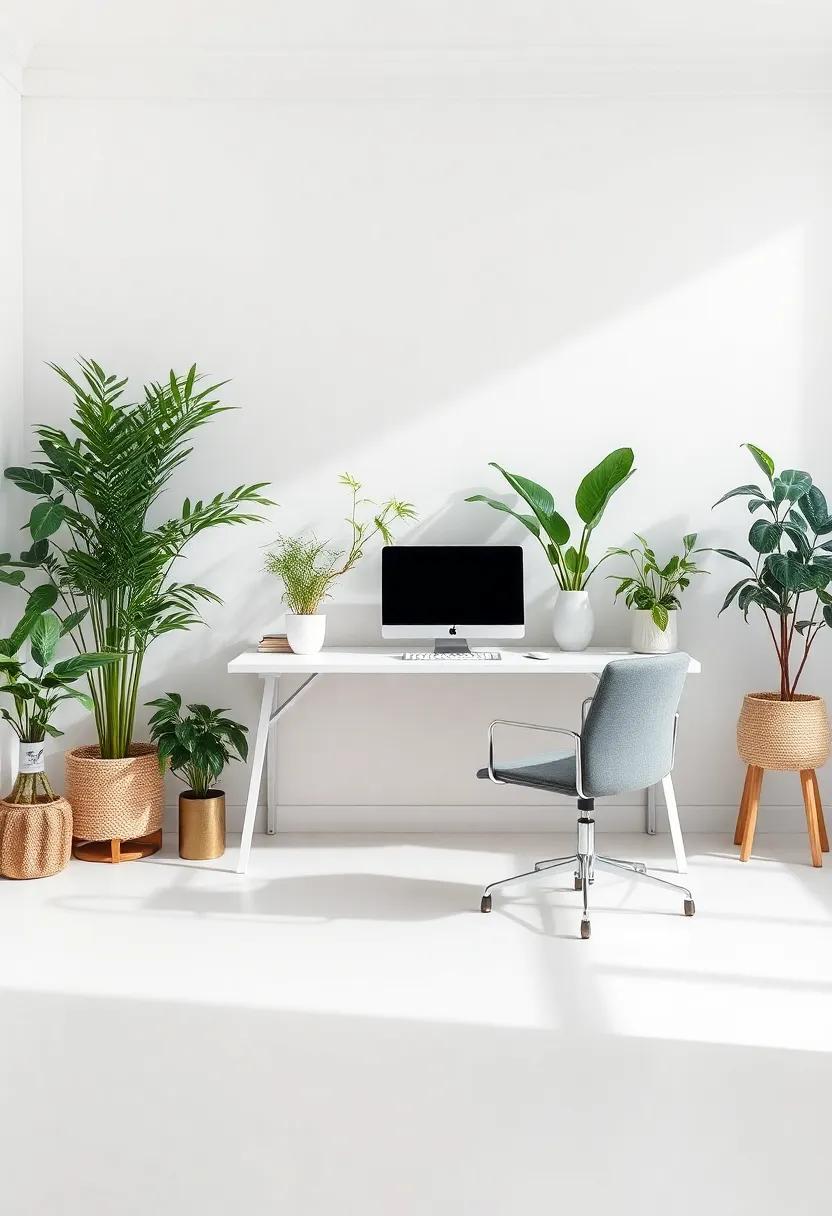
Incorporating plants into a shared workspace can transform the ambiance, fostering a sense of tranquility and inspiration. Consider adding low-maintenance varieties that thrive indoors, such as:
- Snake Plant: A hardy plant known for its air-purifying qualities.
- Pothos: With trailing vines, it’s perfect for adding a touch of greenery without taking up much space.
- ZZ Plant: Appreciated for its resilience, it can survive in low light and with little water.
To maximize both aesthetic appeal and functionality, strategically place these plants on shelves, desks, or hanging planters. Grouping plants together can create a mini indoor garden,providing both visual interest and improving air quality. A well-considered plant arrangement not only enhances the office environment but also serves as a natural buffer between workspaces. Explore more about curating your indoor garden at The Sill, where you can discover the perfect plant companions for your professional oasis.
Establishing Boundaries in a Shared Workspace to Enhance Focus
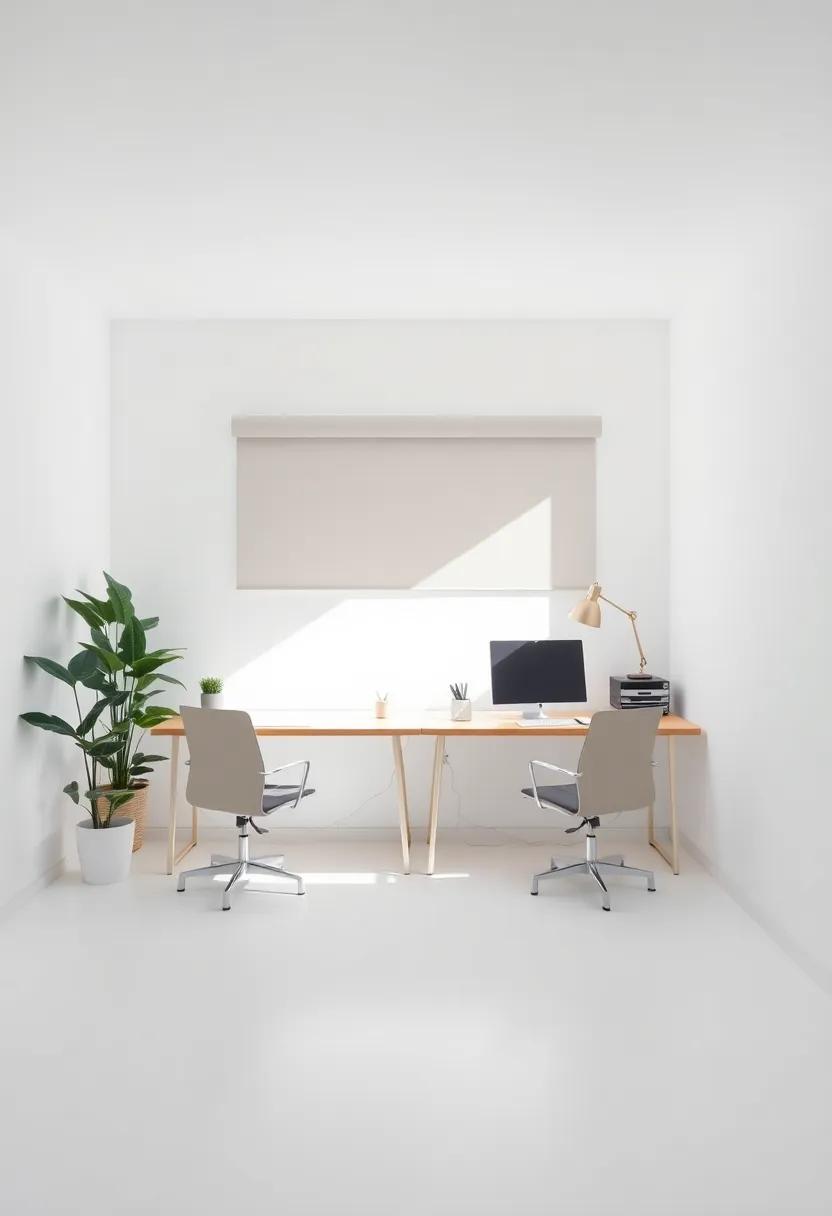
Creating an optimal environment for productivity in a shared workspace requires clear boundaries that foster concentration and respect individual work styles.To achieve this, it’s essential to establish designated zones for different tasks. Consider the following strategies:
- Visual Boundaries: Use room dividers or bookshelves to create distinct areas for each professional.
- Time Blocking: Set specific hours where each person can work uninterrupted, communicating schedules through a shared calendar.
- Noise Control: Incorporate headphones or white noise machines to minimize distractions.
Another critical aspect in a shared setting is the ability to communicate openly about each other’s needs and preferences. Hold regular check-ins to discuss what’s working and what isn’t, allowing for adjustments as necessary. This promotes a flexible atmosphere where both individuals can thrive while respecting boundaries.Review your setup periodically, and don’t hesitate to modify aspects that disrupt focus. for more insights on workplace productivity,visit Forbes.
Lighting layers: Mixing Ambient, Task, and Accent Lighting for Balance
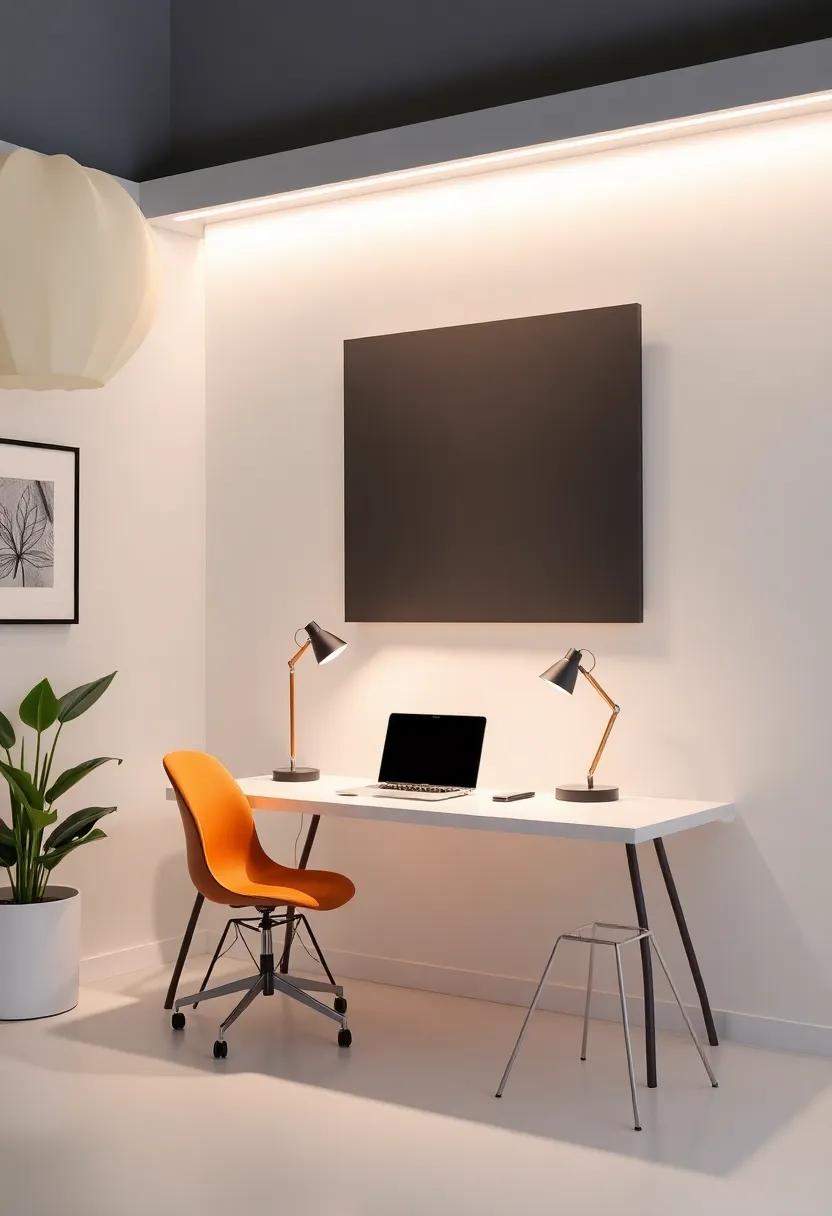
To create a well-balanced lighting scheme for your home office shared by two professionals, it’s essential to integrate ambient, task, and accent lighting strategically. Ambient lighting serves as the foundation, filling the room with a warm glow that sets the overall mood. Consider ceiling-mounted fixtures or floor lamps that diffuse light evenly.Next,pinpoint areas where focused tasks are performed. Task lighting can be achieved with desk lamps that provide bright, directed light for reading and working.Ensure that each professional has their designated task light to reduce eye strain and enhance productivity.
incorporate accent lighting to add depth and interest to the space. Use wall sconces or LED strips to highlight artwork or features that inspire creativity. Incorporate lighting that complements both individuals’ tastes for a personalized touch. Create a lighting plan that includes the following:
- Ambient Lighting: Ceiling lights, soft diffused lamps
- Task Lighting: Adjustable desk lamps, under-cabinet lights
- Accent Lighting: Decorative sconces, artwork spotlighting
| Lighting Type | Purpose |
|---|---|
| Ambient | Overall illumination |
| Task | Focused work area lighting |
| Accent | Highlight design features |
To explore more ideas on lighting design, check out Lighting Design.
Crafting a Mood Board to Visualize Your Dual Office Design Concept
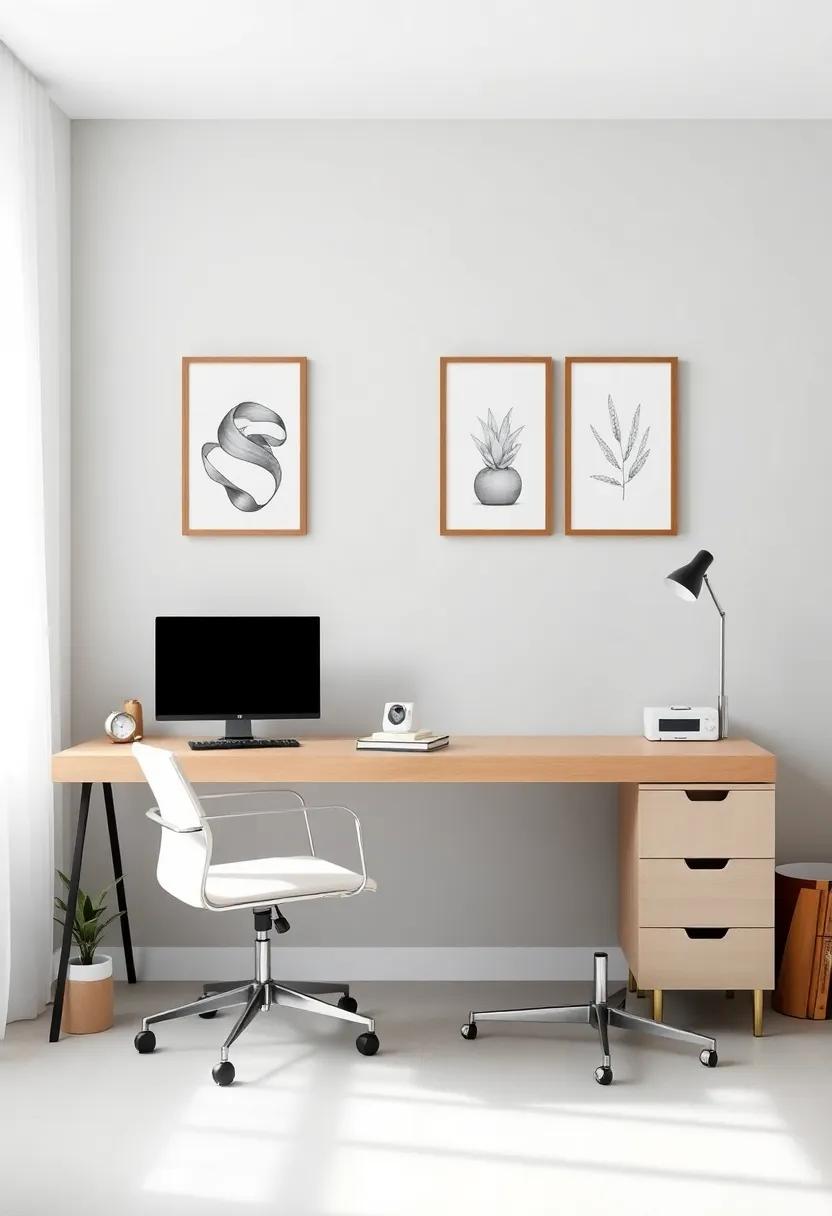
Creating a visual portrayal for your shared office space can be an exhilarating endeavor, allowing you to meld two unique aesthetics into one harmonious design. Start by gathering inspiring images,color palettes,and textures that reflect both professionals’ styles. Consider including elements such as:
- Furniture styles: Choose pieces that complement each other, whether it’s sleek modern desks or cozy vintage chairs.
- color schemes: Opt for a balance of warm and cool tones that promote productivity and creativity.
- Decor accents: From art prints to plants, select items that add personality while maintaining a cohesive look.
Once your materials are in place, you can create a physical or digital mood board to visualize the concept. Digital tools like Canva or Pinterest make it easy to drag and drop your selections, helping you experiment with various combinations. By incorporating a variety of textures and elements, you can foster a unique atmosphere that speaks to both individuals. A well-curated mood board not only offers an exciting preview of your dual office design but also serves as a tangible reference throughout the design process. For more design inspiration, check out Architectural Digest.
Incorporating Multi-Functional Storage Solutions to Reduce Clutter
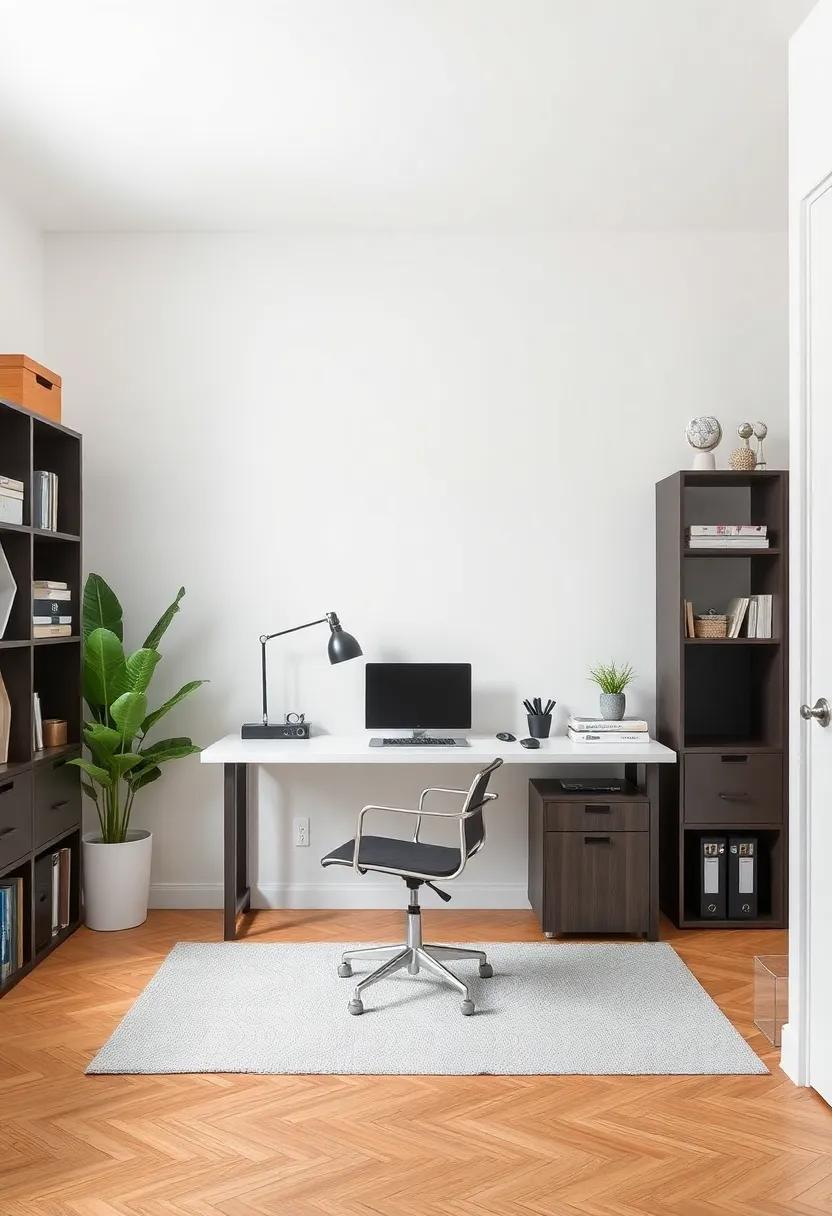
To create a harmonious workspace for two professionals,incorporating multi-functional storage solutions is crucial in minimizing clutter and maximizing efficiency.Consider integrating shelves that double as decorative elements,where books,plants,and personal items can coexist. Use stylish storage bins or baskets to keep essential office supplies organized without compromising aesthetics.Opt for a modular desk with built-in compartments that allow both users to access their materials easily while maintaining a clean, streamlined appearance.
Another innovative approach is to utilize wall space by installing floating cabinets that not only store files and documents but also serve as a platform for personal touches, such as photographs or accolades. Under-desk storage solutions can also free up valuable floor space,allowing for a more open and inviting atmosphere. To help visualize the organization and arrangement of these storage elements, consider a layout that includes:
| Storage Solution | Functionality | Benefits |
|---|---|---|
| Floating Shelves | Display & Storage | Space-saving & Aesthetic |
| Modular Desk | work Surface & Storage | Customizable & Accessible |
| Under-desk Bins | Concealed Storage | Clutter Reduction & Easy Reach |
By embracing these versatile storage strategies, you can create a workspace that echoes the shared vision of productivity while catering to individual styles. For additional inspiration on home office storage solutions, visit Houzz.
Exploring Artistic Decor Options to Stimulate Creativity and Motivation
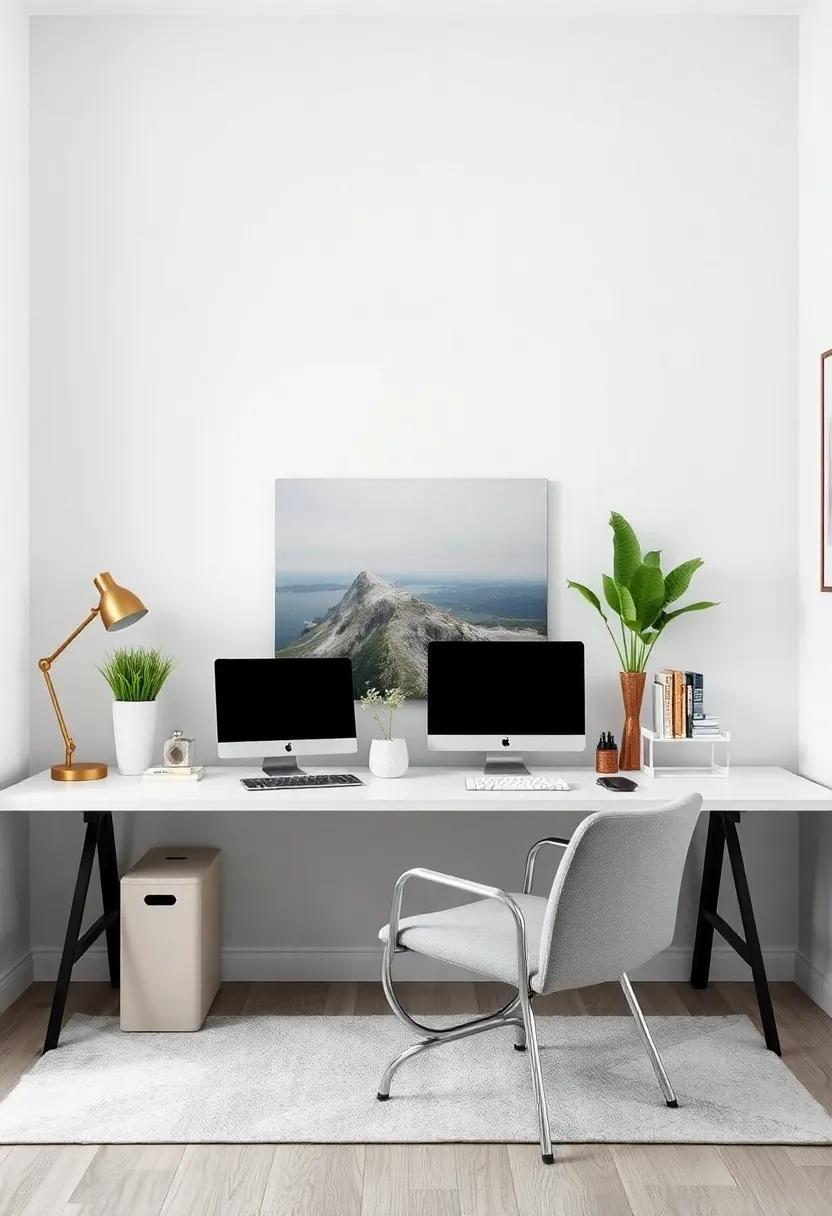
In a shared workspace, the right decor can significantly uplift the atmosphere, making it an inspiring place for both professionals. Incorporating elements that resonate with creativity can turn an ordinary office into a vibrant environment. Consider adding colorful artwork or mood boards that reflect personal interests and combined professional aspirations. Wall art featuring abstract designs or motivational quotes can evoke a sense of positivity, while plants add a touch of nature, promoting well-being and creativity. Integrating functional decor that doubles as storage, such as stylish shelves or decorative baskets, can keep the area uncluttered, enhancing focus and productivity.
Designing a workspace that stimulates creativity can also involve clever use of lighting and spatial arrangement. Natural light is essential; position desks near windows to encourage a bright and airy feel. Complement this with adjustable task lighting to adapt the mood as needed. Using distinct work zones defined by rugs or screens can promote collaboration while also providing personal space. Incorporating an inspirational corner with books, quotes, and creative tools can serve as a recharge zone, perfect for short breaks. Explore more artistic decor ideas on Pinterest for endless inspiration that can transform your home office into a haven for creativity.
Designing for Flexibility: Adapting Your Workspace for Diverse Tasks
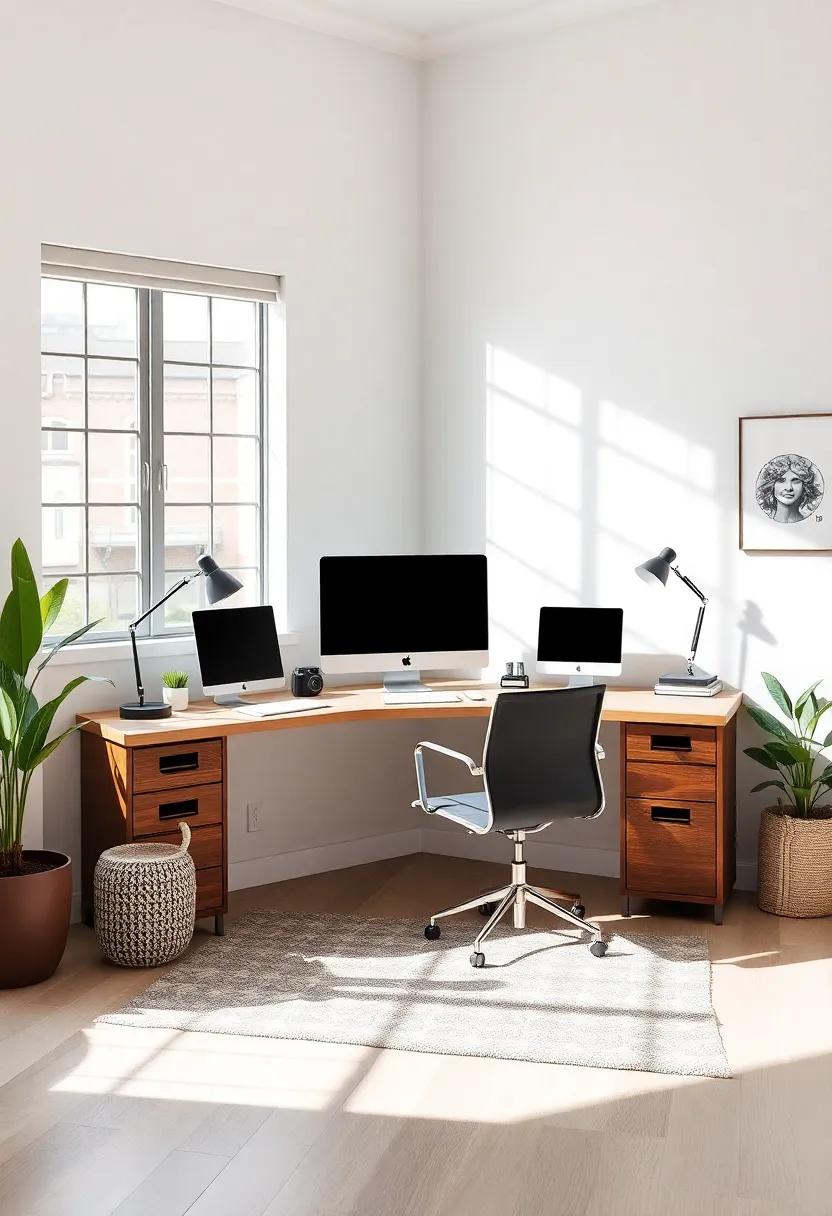
When crafting a dual-purpose workspace, it’s essential to incorporate elements that promote flexibility and adaptability. Begin by considering modular furniture that can be easily rearranged or reconfigured to suit varying tasks, such as meetings, focus work, or collaborative brainstorming sessions. Look for items like:
- Adjustable desks that allow for sit-stand options.
- Rolling carts or storage units for easy mobility.
- Convertible seating that can transform from casual lounge to formal seating as needed.
Additionally, integrating diverse zones within the workspace can cater to different work styles. Establish designated areas for focused work, collaborative tasks, and even relaxation. Use a combination of colors and textures to delineate these spaces; for instance, calming blues in concentrated areas and vibrant oranges in collaborative sections.To further optimize the environment, consider incorporating technology solutions such as:
| Technology | Purpose |
|---|---|
| Smart lighting | Adjust brightness based on task and time. |
| Noise-canceling headphones | Create a distraction-free zone. |
By thoughtfully designing each area to be responsive to the task at hand, both professionals can maintain productivity and comfort, ensuring a harmonious balance in their shared office environment.For more insights on home office design, check out Houzz.
Crafting a Cozy Break Area to Foster Recharge and Relaxation
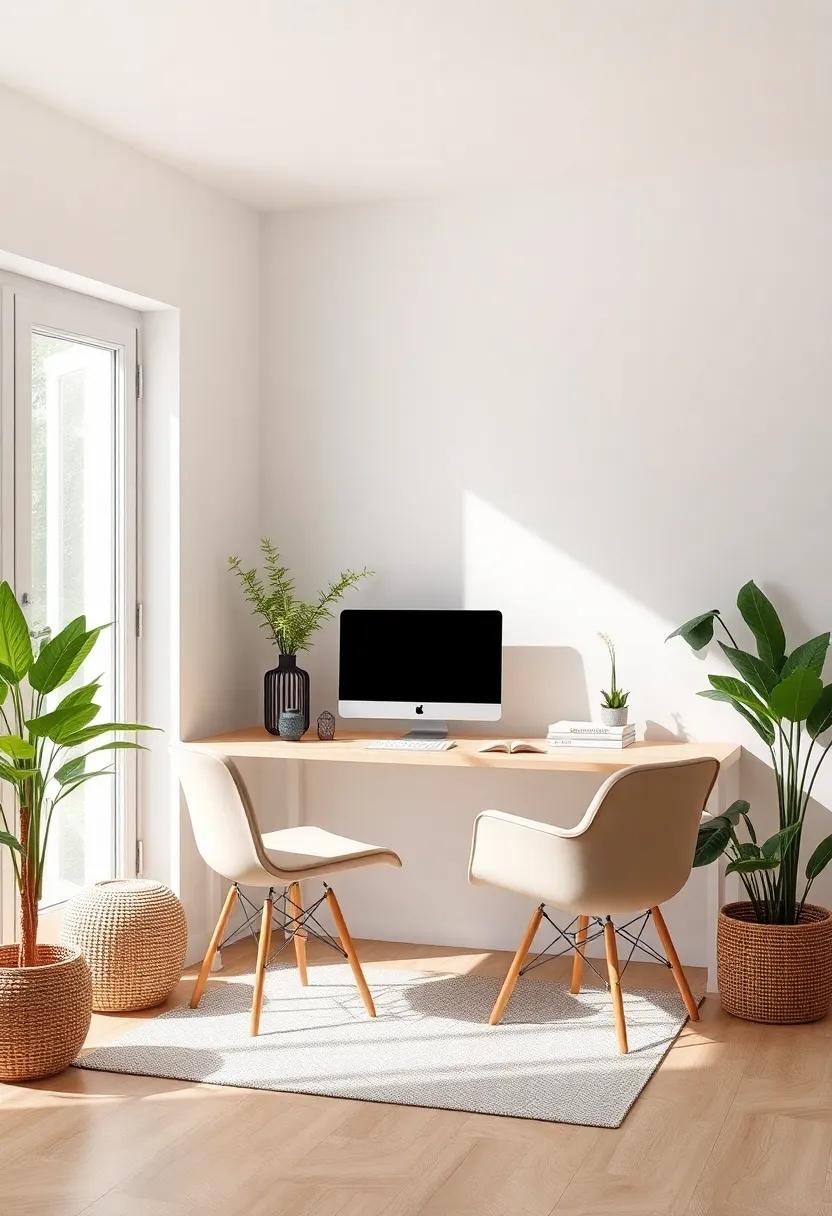
Designing a comfortable break area is essential for enhancing productivity and well-being in a shared home office. This space should encourage both relaxation and reconnection,featuring comfortable seating options where you can unwind during short breaks. Consider incorporating elements such as:
- Plush seating: Bean bags, lounge chairs, or even a small sofa can create an inviting atmosphere.
- Warm lighting: Use soft-glow lamps or string lights to create a calming ambiance.
- Natural elements: Incorporate plants or flowers to bring life and color, helping to reduce stress.
- Aromatic accents: Scented candles or essential oil diffusers can enhance relaxation and promote a sense of well-being.
It’s also beneficial to add a few engaging activities that may offer a mental recharge. Setting up a small table with games or books can provide a welcome distraction during moments of stress. For an organized approach, you might consider a designated “refreshment corner” equipped with snacks and drinks. Here’s a quick overview of snack ideas to keep you energized:
| Healthy Snacks | Indulgent Treats |
|---|---|
| Fresh fruits | Chocolate bites |
| Trail mix | Cookies |
| Nut butter on rice cakes | Mini pastries |
By thoughtfully crafting this break area, you foster a nurturing environment that allows for genuine relaxation and rejuvenation, promoting harmony in your joint workspace. For more inspiration on creating cozy spaces, you might find Houzz helpful.
Choosing the Right Office Equipment for Enhanced Collaboration
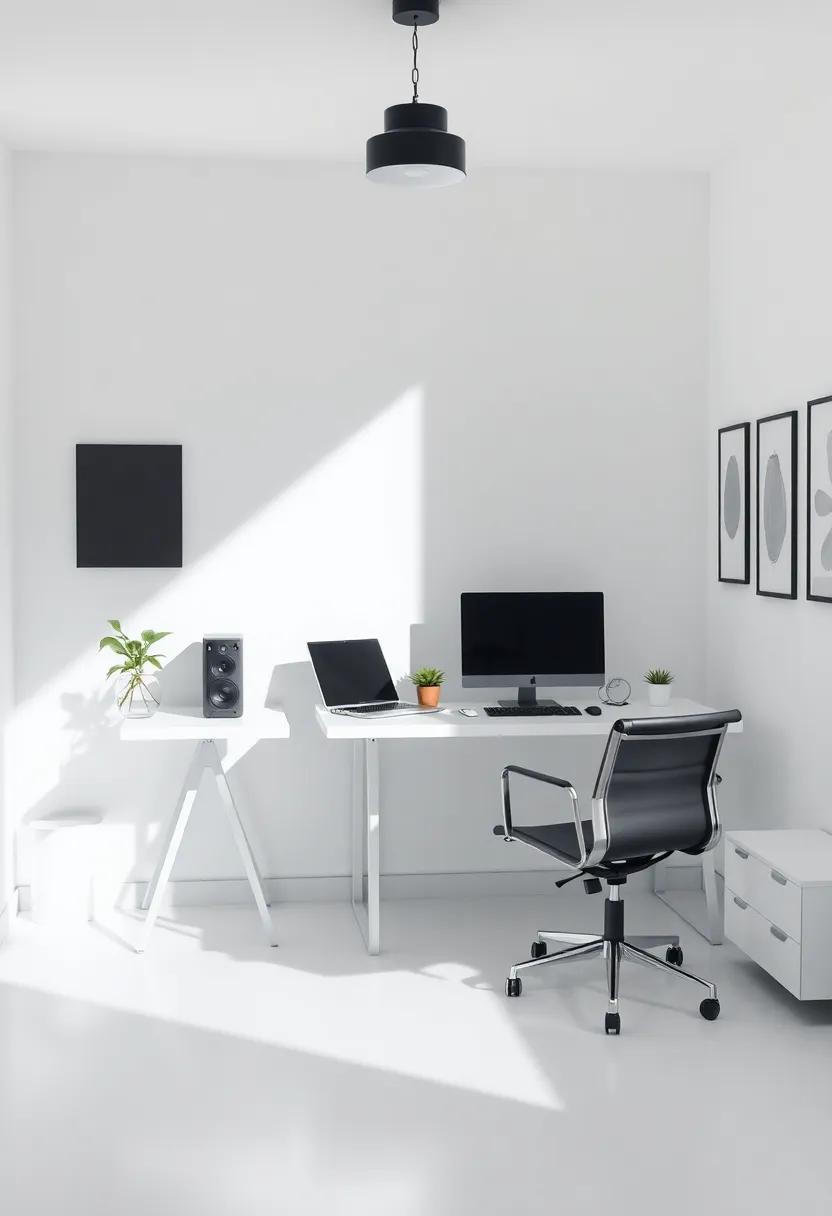
When designing a shared workspace, it’s essential to select office equipment that fosters collaboration and efficiency. Consider investing in dual-purpose furniture that allows you to maximize the available space. Opt for items like a large, extendable table, or modular desks that can be rearranged according to your needs. additionally, incorporating shared technology such as wireless chargers, dual monitors, or smartboards can significantly enhance interaction during brainstorming sessions. Keep in mind that flexibility is key,so look for furniture that can easily adapt to various tasks,whether it’s an intense project discussion or a casual coffee break.
Moreover, prioritize tools that promote seamless communication and connectivity. Ensure that your shared office is equipped with high-quality audio-visual equipment, such as web cameras and microphones, to facilitate remote meetings effectively. Implementing a well-designed cable management system can also reduce clutter and distractions, allowing both professionals to focus on collaboration. to help you choose the right tools, refer to resources from established sites like TechRadar, which provide reviews and recommendations on the latest office equipment tailored for team environments. By blending comfort with functionality, you can create a harmonious workspace that inspires collective creativity.
Exploring Inspirational Office Designs from Successful dual Professionals
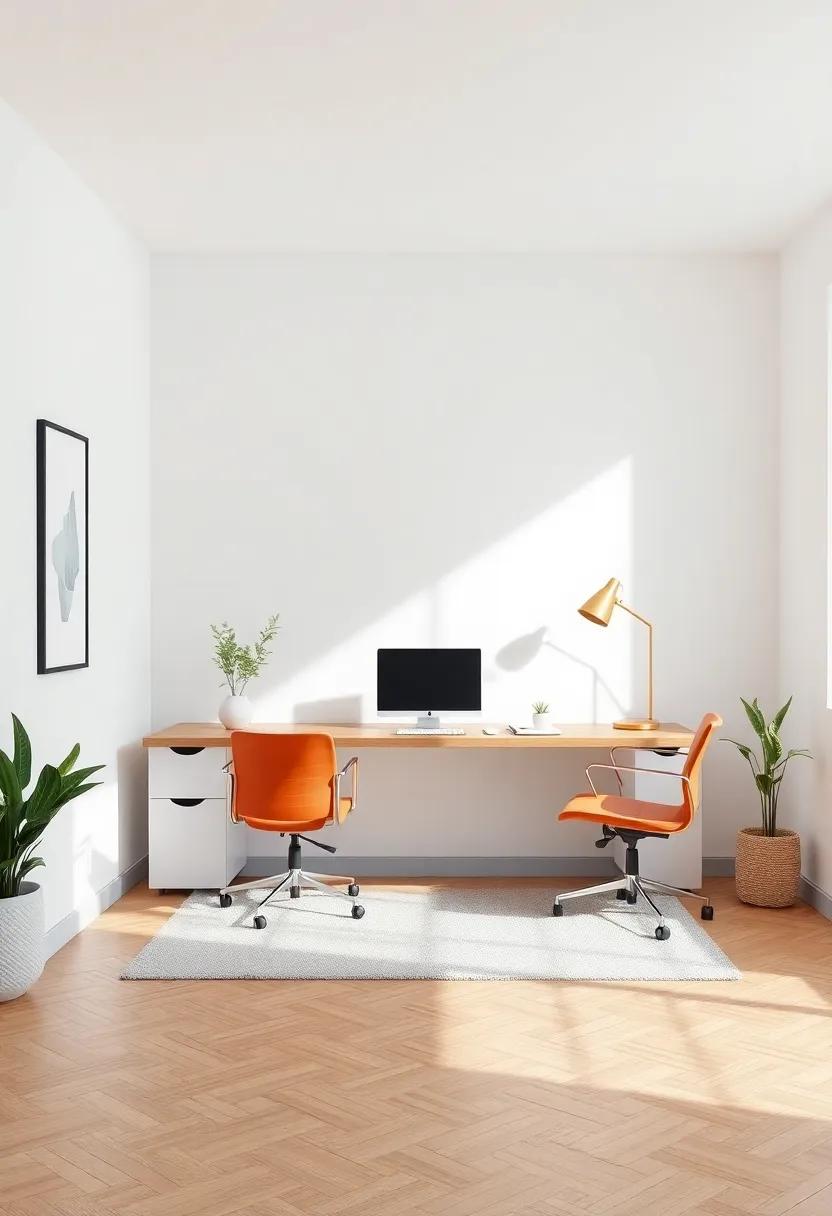
When it comes to designing a shared workspace for two professionals, creativity and functionality are key. The ideal setup often embraces an open layout that fosters communication while incorporating personal touches to maintain individual identities. Consider color schemes that support focus—muted tones can create a calming atmosphere,while pops of brighter colors can enhance motivation. Key elements might include:
- Ergonomic furniture: Invest in adjustable desks and comfortable chairs to promote health and well-being.
- Personalized decor: Encourage each professional to showcase their unique style with wall art and desk accessories.
- Shared tech solutions: Centralized charging stations and high-quality printers can cut down on clutter and improve productivity.
In addition, integrating natural elements boosts the ambiance of a dual office. Incorporating plants, natural light, and outdoor views can greatly affect mood and efficiency. A well-designed workspace acknowledges both individual needs and collaboration opportunities. Here’s a quick overview of inspirational layouts that successfully balance unity and separation:
| Layout Type | Description | Benefits |
|---|---|---|
| Open Plan | Shared desks with distinct zones. | encourages collaboration and communication. |
| two-Desk Setup | Separate desks facing each other for interaction. | Balances personal space with partnership. |
| Furniture Partition | Use bookshelves or screens to divide workspaces. | Offers privacy while maintaining a shared environment. |
For more ideas on creating a harmonious home office, check out Houzz for a plethora of design inspirations!
Future Outlook
crafting a harmonious home office for two professionals is a delicate balancing act that combines personal aesthetics, functional design, and mutual respect. As we navigate the nuances of shared spaces, it’s essential to prioritize communication and collaboration in the design process.By embracing individual styles while finding common ground, couples can create a workspace that not only enhances productivity but also fosters a sense of partnership. As you embark on this journey, remember that the perfect home office is not just about the furniture or decor; it’s about cultivating an environment that nurtures creativity, supports growth, and celebrates the unique dynamic you share. So, take a deep breath, roll up your sleeves, and turn your vision into reality – after all, a well-designed workspace can be the key to unlocking your professional potential together.
As an Amazon Associate I earn from qualifying purchases.

